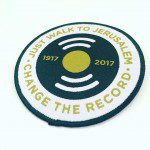Well, you can’t say you haven’t been told.
The Christian community in Occupied Palestine has just called time on 70 years of world-wide Christian/Jewish collusion in their oppression and slow demise. In an open letter to the World Council of Churches, they’re demanding a different course of action from their Christian sisters and brothers because, they write, the situation is now “beyond urgent”.
The exasperation of the National Coalition of Christian Organizations in Palestine is understandable. The Church around the world has failed them.
They’ve seen year after year of Holy Land reports, theological reflections, pilgrimages, conference debates, and the occasional divestment commitment. But all this softly, softly solidarity has failed to improve their condition, let alone win their liberation.
Yes, there’ve been plenty of carefully worded and balanced calls for “justice” and “security” for Christians, Jews and Muslims. But no calling out of who has the power, who uses it to oppress, who allows it to continue, who excuses it, who remains silent.
Nor has there been much willingness to incur a collective cost to any Palestinian solidarity, either financially or reputationally from the leadership of Church denominations.
The Ecumenical Deal
Much of this comes down to what the Jewish theologian Marc Ellis long ago described as ‘the ecumenical deal’. It amounts to this: the unwillingness within formal Christian Jewish encounters to question Jewish support for Israel for fear of unpicking decades of interfaith reconciliation following the Holocaust.
Ellis, writing for the journal of Americans for Middle East Understanding back in February 1992 summed up how this has become an obstacle to justice:
“The foundation of the dialogue rests on Christian repentance for anti-Jewishness and acceptance of Israel as central for Jewish identity. Those involved in the dialogue know that it has essentially turned into what one might call the ecumenical deal: eternal repentance for Christian anti-Jewishness unencumbered by any substantive criticism of Israel. Substantive criticism of Israel means, at least from the Jewish side, the reemergence of Christian anti-Jewishness.”
The outcome of the ecumenical deal, Ellis went on to say, is that debate about the oppression of the Palestinian people by Israeli Jews, and its support by “commission or omission” by Jewish and Christian communities around the world is left unchallenged.
Despair
25 years of failed peace process, a wave of Palestinian terrorism at the turn of the century, three major Israeli assaults on Gaza and a Jewish Settler population of now more than half a million has done little to shift the interfaith dynamics that Ellis described a quarter of a century ago.
So it’s hardly surprising to see Christians in Palestine despairing of the endless “hiding behind the cover of political neutrality” and the unwillingness of Church leaders “to offend their religious dialogue partners.” In Palestine they learnt long ago that liberation doesn’t come cheap. What’s required from us they say is “costly solidarity” not “shallow diplomacy”.
And in practice that means:
“That you revisit and challenge your religious dialogue partners, and that you are willing to even withdraw from the partnership if needed”
So brace yourselves. Jewish-Christian dialogue is about to go through the wringer. And not before time.
The cost of Christian solidarity
To reset the Christian interfaith relationship with the Jewish Community will take boldness and courage on the part of Church leaders, local ministers and their congregants. It will take them far from their ecumenical comfort zone.
Long standing relationships with Jewish neighbours and clerical colleagues will deteriorate long before they can be rebuilt with new foundations.
But costly solidarity requires no less.
It means refusing to allow your local Jewish communal leadership to set the boundaries of permissible debate on Israel.
It means listening to the Christian voice under occupation before the Jewish voice living comfortably, with full equal rights, many thousands of miles from that same occupation.
It means refusing invitations to Balfour ‘celebrations’ this November.
It means you, not them, deciding what forms of protest are appropriate and fair.
It means you choosing to invest your funds in ethics not in companies profiting from Occupation.
It means your next pilgrimage to the Holy Land may be turned back at Ben Gurion airport.
It means you WILL be branded Israel haters.
You WILL be branded antisemitic.
And when that happens you should refuse to be bullied (because that’s what it is).
You must call the Jewish officials to your office. Ask them to clarify their position. Seek legal opinion. Demand an apology.
Insist that those that accuse you of ‘unfairness’ and ‘lack of balance’ make clear their own position.
What’s their view on the legality of the Occupation and Settlements? Do they recognise the inequality of political, civil and human rights in Israel itself and the Occupied territories? Can they confirm their commitment to freedom of speech in a democracy?
And do all of this publicly.
This is what costly solidarity will look like until things change.
Because silence and collusion on a great injustice of our time cannot be the basis of healthy interfaith dialogue.
But what about the Jewish side?
We still don’t have an accepted Jewish vocabulary or conceptual thinking that will enable us to recognise our complicity in Palestinian suffering. That makes the idea of Palestinian solidarity almost impossible for most Jews to contemplate let alone sign up to.
We’re still stuck in a mindset of powerlessness and victimhood that no longer holds true. The dilemma for Jews is that questioning the State of Israel within our Jewish communities risks unraveling the collective sense of who we are and what being Jewish means in the 21st century.
The recalibration on Israel required from Jewish communities around the world is now just as profound as the soul searching that took place within Christianity after the Holocaust. Just as Christians had to look Jews in the eye and ask for forgiveness so that Christianity could move forward, the same will be true between Jews and Palestinians. Again, this is ground well covered in the writings of Marc Ellis.
The future for Jews and Judaism itself is now entirely bound up with our relationship to the Palestinian people. However, we are still a very long way from being ready to confront this truth.
Costly Christian solidarity with the Palestinian people has the potential to speed up a change in Jewish attitudes. But it requires turning the tables over in the temples of ecumenical deal making.
I’m not underestimating how difficult this will be. The Jewish response to costly Christian solidarity with the Palestinians will be hostile and intolerant, at least to start with. The current Jewish leadership of our communities around the world is conditioned to react like this. They have no other language or thinking available to them.
But changing the language of interfaith dialogue is what needs to happen, and the sooner the better. Shallow diplomacy has had its day.
A new basis for Jewish/Christian understanding
So what should the new dialogue look like? How do we keep the good progress made over the last 70 years but throw out the politics of a silent collusion of injustice ?
Perhaps a celebration of our creation mythology that makes clear that all humanity is equal in God’s eyes.
Maybe a common commitment to building communities where all faith traditions are respected and honoured.
How about a shared understanding that national chauvinism will always undermine building the Just and Righteous society that Jews and Christians pray for each day.
Or how about a firm belief that solidarity with the oppressed comes with a cost that’s always worth paying.
Otherwise, what exactly are we all being faithful to?
















